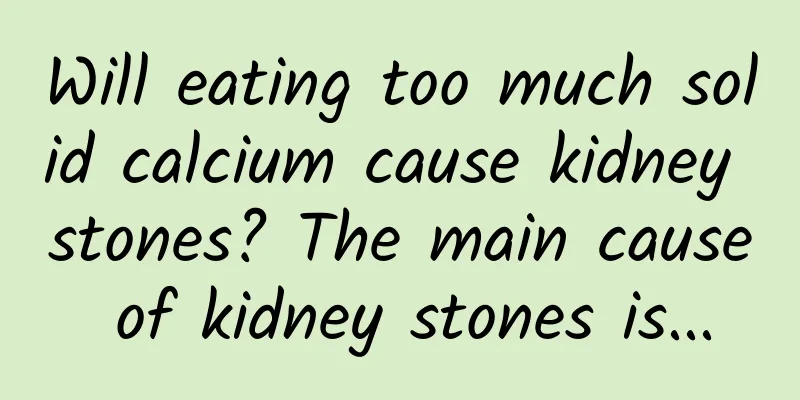Will eating too much solid calcium cause kidney stones? The main cause of kidney stones is...

|
Author: Li Jie, attending physician, Department of Endocrinology, Second Hospital of Hebei Medical University Reviewer: Zhang Songyun, Deputy Director and Chief Physician, Department of Endocrinology, The Second Hospital of Hebei Medical University gossip As the age of osteoporosis patients is getting younger, especially among women, calcium deficiency is more common, so calcium supplementation has become a daily "maintenance" item for many people. However, there is a saying that " taking too much calcium supplementation, especially solid calcium, can cause kidney stones ", which makes many people feel caught in a dilemma. In response to this, "Calcium" said: I won't take the blame for this! Copyrighted stock images, no reproduction is authorized analyze High levels of oxalate in urine The main cause of calcium stones The most common type of kidney stones is calcium stones, accounting for about 80%, and other kidney stones such as uric acid stones, magnesium ammonium phosphate stones, and cystine stones account for the remaining 20%. Among calcium stones, calcium oxalate stones are the main type, and calcium phosphate stones are occasionally found. Calcium stones, from the name, can easily lead to the misconception that "calcium supplementation can easily lead to stones", but this is not the case. First, let’s look at how calcium stones are formed. Most calcium stones are calcium oxalate stones. This is because oxalate is commonly found in various foods. When the human body consumes too much oxalate, the concentration of oxalate in urine increases, which combines with urinary calcium to form crystals. When the crystals gather locally, they form stones. Ultimately, the cause of urinary stones is the increase in oxalate and phosphate in urine, not calcium supplementation. Copyrighted stock images, no reproduction is authorized What factors promote calcium stone formation? Many metabolic, anatomical, and dietary factors may contribute to the development of calcium stones. Major risk factors include: high urine calcium (>0.1mmol/d), high urine oxalate (>25mg/d), low urine citrate, decreased urine volume, dietary factors, and some medical diseases. Each type of stone has its own risk factor, for example, high urine oxalate is a risk factor for calcium oxalate stones, and high urine pH is a risk factor for calcium phosphate stones. Here, we mainly talk about the problem of hypercalciuria. The main causes of hypercalciuria include primary hyperparathyroidism and chronic acidemia. There is also a part of hypercalciuria with unknown causes, which is called idiopathic hypercalciuria . Supplementing with physiological doses of calcium will not cause hypercalciuria. Only supplementing with extremely large doses of calcium (more than 2500 mg per day) can cause hypercalciuria and urinary stones. While taking calcium tablets, the unabsorbed residual calcium reacts with oxalic acid in the intestinal cavity to form insoluble calcium oxalate, which is excreted from the body through feces, thereby reducing the absorption of oxalate into the blood and achieving the purpose of preventing stones. Copyrighted stock images, no reproduction is authorized However, we should note that only when calcium is taken together with foods containing oxalate can the absorption of oxalate be effectively reduced. Calcium supplements are usually taken in the morning or before bedtime, not with meals, and the effect of oxalate in the diet is weak. Therefore, we cannot reduce the incidence of stones by unlimited calcium supplementation. People who are prone to stone formation should avoid foods high in oxalate Calcium supplementation needs to be adequate Finally, how can we supplement calcium without causing kidney stones? The Chinese Nutrition Society has formulated a recommended calcium intake of 800 mg/d for adults to maintain normal bone mass. If the calcium supply in the diet is insufficient, calcium supplements can be used. The calcium intake of the elderly is increased to 1000 mg/d , and the requirement for women in late pregnancy and lactation is even higher, increasing to 1200 mg/d. The current dietary nutrition survey shows that the average daily calcium intake of the elderly in my country is about 400 mg, so the average daily calcium supplementation is 500-600 mg. Therefore, we usually supplement calcium 600 mg/d, which can maintain normal bone mass without causing an increase in urine calcium and the incidence of stones. If you have been diagnosed with urinary stones or have a physique that is prone to stones, it is recommended that you eat less foods high in oxalate, such as spinach, strawberries, carrots, green grapes, celery, limes, mushrooms, etc., and drink 2500-3000ml of water daily. At the same time, moderate exercise is also essential. in conclusion When the daily calcium intake of the human body is lower than the physiological requirement, calcium supplementation is needed to maintain normal bone mass and prevent osteoporosis. Physiological doses of calcium supplementation will not increase the incidence of stones. If there are other comorbidities, calcium supplementation should be taken with more caution and under the professional guidance of a doctor. The article is produced by "Science Refutes Facts" (ID: Science_Facts). Please indicate the source when reprinting. The cover image and images within this article are from the copyright gallery. Reprinting and quoting them may lead to copyright disputes. |
Recommend
Pregnant women's t4 is low and other normal
During the prenatal check-up, if the T4 level of ...
What is the cause of excessive vaginal discharge?
If women want to have a healthy baby as soon as p...
Brown discharge after ovulation
For women, if there is abnormal leucorrhea, you m...
What are the common symptoms before menstruation?
For women, menstruation can be regarded as a loya...
Can hemorrhoids be cured during breastfeeding?
Women's physical activity is relatively low d...
What to do if your period is delayed for 8 days
However, many women in life will experience delay...
What is the reason for irregular menstruation? How to adjust it
Menstruation is relatively regular for female fri...
How to treat seborrheic dermatitis in girls?
Seborrheic dermatitis is a common skin disease. B...
Comfortable sleep in early summer
This is the 4372nd article of Da Yi Xiao Hu As th...
What to do if a woman has vaginal dryness after menopause
Vaginal dryness is very common in women after men...
Is there any trick to make crucian carp soup white? What is the key to making crucian carp soup white?
We all know that crucian carp soup is a relativel...
Why do pregnant women urinate frequently and urgently?
During the pregnancy process, the pregnant woman&...
How long does it take to recover from autologous fat breast augmentation?
In addition to the methods of massage and food fo...
Is it good to have less bleeding after miscarriage?
After painless abortion, the bleeding time genera...
Precautions for cervical excision
Many women have cervical disease, which is very h...









